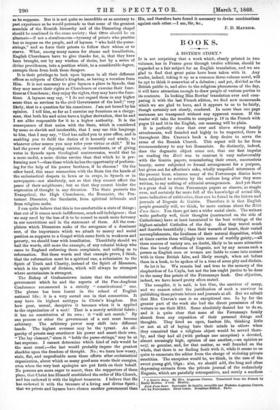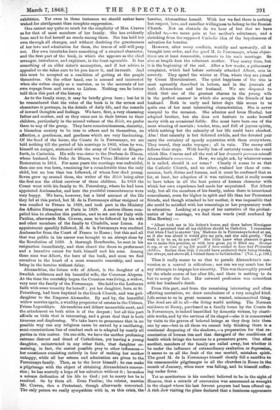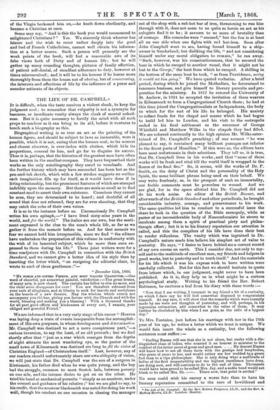BOOKS.
A SISTER'S STORY.*
IT is not surprising that a work which, closely printed in two volumes, has in France gone through twelve editions, should be regarded as a fair subject for an English translation, and we are glad to find that great pains have been taken with it. Any reader, indeed, taking it up as a common three-volume novel, will be apt to think it somewhat of a delusion ; and yet, divided as the British public is, and alive to the religious phenomena of the day, it will have attraction enough to draw people of various parties to its contents. In looking Miss Bowles' translation over and com- paring it with the last French edition, we find new memoranda which we are glad to have, and it appears to us to be fairly, though certainly not closely, rendered. In more than one page sentences are transposed without any apparent reason. If the reader will take the trouble to compare p. 18 in the French with pages 15 and 16 in the English, our meaning will be plain.
It is perfectly clear that over and above strong family attachments, well founded and highly to be respected, there is throughout Mrs. Craven's book a deep desire to serve the cause of the Romish Church. This aspect will be far from recommendatory to any but Romanists. So distinctly, indeed, does the dogmatic object come out, that our first impulse on reading the .Rdcit was to contrast it very unfavourably with the Guerin papers, remembering their sweet, unconscious beauty, never subjected to formal arrangement for a purpose, but given out for affection's sake, wholly unspoiled utterances of the present hour, whereas many of the Ferronnays diaries have been subjected to revision by the authors long after they were written, to say nothing of editorial arrangements. And yet there is a great deal in these Ferronnays papers as sincere, as simple even, and certainly far more full of the knowledge of actual life, more indicative of cultivation, than can be found in the letters and journals of Eugenie de Guerin. Therefore it is that English people generally will, we think, be more curious about the Ricit d'une Sceur. You there get into a wider social circle. The writers write perfectly well, their thoughts (contracted on the side of Catholicism) have at least luxuriated in the best writings of the highest-minded Catholics of the day. Also they travel much and describe beautifully ; then their warmth of heart, their varied accomplishments, the liveliness of their natural disposition, which at times carries them willingly into scenes of worldly gaiety,—all these sources of variety are, no doubt, likely to be more attractive than the lonely effusions of Eugenie, not by any means such a person as English men or women are liable to come into contact with in these British Isles, and likely enough, when set before them in a book, to be spoken of in a tone of some pity and disdain.
So let it be. We remain leal and true to the memory of the shepherdess of La Cayla, but not the less ought justice to be done to the many fine points of the Ferronnays book. One objection, indeed, we have heard pretty often stated.
The compiler, it is said, is but One, the survivor of many, and we cannot admit the justification of such a survivor in publishing these private letters and journals at all. But we submit that Mrs. Craven's case is an exceptional one. In by far the greater part of the work she had the direct permission of the writers to use their MSS. Some absolutely desired her to do so, and it is quite clear that none of the Ferronnays family shrank from any exposition of their personal doings and thoughts. They lived an open, fearless life, thinking little or not at all of laying bare their minds to others when they conceived that a religious object would be served there- by, and they had all (with perhaps one exception) a devoted, almost amusingly high, opinion of one another,—an opinion so nay; so genuine, and, for that matter, so well founded on the whole, that there is no finding fault with it, while it seems to us quite to exonerate the editor from the charge of violating private sanctities. The exception would be, we think, in the case of the sweet young girl, Olga ; also, we should add, the long and often depressing extracts from the private journal of the melancholy Eugenie, which are painfully retrospective, and surely a needless • et Sister's Story. By Mrs. Augustus Craven. Translated from the French by Emily Bowles. 3 vols. Bentley.
Recit duns Stour. Souvenirs de famille, recueillis par Madame Augustus Craven, née La Ferronnays. Deux tomes. Dounibme Edition. Paris.
eThibition. Yet even in these instances we should rather have wished for abridgment than complete suppression.
One cannot say quite so much for the simplicity of Mrs. Craven as for that of most members of her family. She has evidently been used to feel herself an oracle among them. She has held her own through all changes, and without doubting the genuineness of her love and admiration for them, the traces of self-will peep out. Her own interludes have something of a strained character, and the first part of the book, in which she appears as the chief arranger, introducer, and explainer, is the least agreeable. It has something of an elder sister's assumption, and if her advice is appealed to she takes care to let you know it, and its result. And this must be accepted as a condition of getting at the people themselves. On the other hand, one is amused and interested when she writes simply as a narrator, as in the accounts of her own voyage from and return to Lisbon. Nothing can be better told than this part of the history.
As to the family story, it may be briefly given here ; but let it be remembered that the value of the book is in the scenes and characters it portrays, in the details of daily life, and the records of inward thoughts and feelings. We have, first, a very charming father and mother, and as they come out in their letters to their children, particularly in the second volume of the Rica, we prefer them to any of the group. They have conscientiousness, sincerity, a blameless anxiety to be true to others and to themselves, an affection, a gentleness, and goodness which are very fascinating. Of the head of the house, the Comte de la Ferronnays, we are told nothing till the period of his marriage in 1802, when he was, himself an emigre, stationed with the army of Conde at Klagen- furth, in Carinthia. His wife was sister to the Duchess de Blacas, whose husband, the Duke de Blacas, was Prima Minister at the Restoration in 1814. For some years the marriage was unfruitful, then one son was born, remaining for a considerable time the only child, but no less than ten followed, of whom four died young. Seven grew up around them, the writer of the Rica being after the first son the eldest survivor of these children. In 1819 the Count went with his family to St. Petersburg, where he had been appointed Ambassador, and here the youthful remembrances were very happy. We have, however, but a brief account of the life they led at this period, but M. de la Ferronnays either resigned or was recalled to France in 1828, and took part in the Ministry des Affaires Etrangeres at Paris in 1829. A serious illness com- pelled him to abandon this position, and to set out for Italy with Pauline, afterwards Mrs. Craven, soon to be followed by his wife and other members of the family to Citadella, near Lucca. An appointment speedily followed, M. de la Ferronnays was credited Ambassador from the Court of France to Rome ; but this and all that was public in his career was brought to an abrupt close by the Revolution of 1830. A thorough Bourbonite, he sent in his resignation immediately, and thus closed the doors to preferment and a lucrative career for both himself and his sons. Among these sons was Albert, the hero of the book, and soon we find ourselves in the heart of a most romantic courtship, and must bring in the heroine without delay.
Alexandrine, the future wife of Albert, is the daughter of a Swedish nobleman and his beautiful wife, the Countess Alopeus. At the time the courtship began the Countess was living, a widow, very near the family of the Ferronnays. She held to the Lutheran faith with some tenacity for herself ; yet her daughter, born at St. Petersburg, had been baptized in the Greek Church, and was god- daughter to the Emperor Alexander. By and by, the beautiful widow marries again, a wealthy proprietor of estates in the Crimea, Prince Lapoukhyn. Alexandrine and Albert meanwhile meet, and the attachment on both sides is of the deepest ; but all this part affords us little that is interesting, and a great deal that is both tiresome and displeasing. We take leave to pronounce that in no possible way can any religious cause be served by a vacillating, semi-conscientious line of conduct such as is adopted by nearly all parties in this matter. On one side, we have the mother professing extreme distrust and dread of Catholicism, yet leaving a young daughter, uninstructed in any other faith, that daughter re- maining, in fact, the easiest possible prey to other influences— her confidence consisting entirely in fear of making her mother unhappy, while all her esteem and admiration are given to the Ferronnays family. Then, as to the lover himself ; he can make a pilgrimage with the object of obtaining Alexandrine's conver- sion; he has scarcely a hope of her salvation without it ; he makes a solemn dedication of his life to God ; yet to marry her he is resolved. So by them all. Even Pauline, the relator, marries Mr. Craven, then a Protestant, though afterwards converted. The only person we really sympathize with is, at this crisis, the heroine, Alexandrine herself. With her we feel there is nothing but respect, love, and manifest willingness to belong to the Romiah Church. Not an obstacle do we hear of but that we have alluded to,—we mean pain at her mother's reluctance, and a,
shrinking from the supposed Catholic idea of the hopelessness of salvation for heretics.
However, after many conflicts, worldly and unwordly, all is brought into order, and the good M. de Ferronnays, whose objec- tions are at least reasonable, consents to his son's marriage. So also at length does the reluctant mother. They marry then, but it is the beginning of the end. After a few weeks, a pulmonary complaint, which had before seriously attacked Albert, sets in severely. They spend the winter at Pisa, where they are joined by Count Montalembert. The quiet happiness of the trio is most agreeably described in letters, and in the journals of both Alexandrine and her husband. We are disposed to think that one of the greatest charms in the young wife is the perfect manner in which she accepts the friends of her husband. Both in early and latter days this seems to us quite one of her most interesting characteristics. She is never unequal to the occasion. She admires and loves Monhal, her adopted brother, but she does not hesitate to make herself merry with an occasional foible. She must have been one of the most winning of mortals ; tender, true, and full of joyous spirits, which nothing but the calamity of her life could have checked. Alas ! that calamity is but deferred awhile, and the devoted pair carry the certainty of speedy separation with them everywhere. They travel, they make voyages ; all in vain. The enemy still follows their steps. With hardly less of certainty comes the event which Mrs. Craven and all the rest of her dramatis personx miscall Alexandrine's conversion. How, we might ask, by whatever name it is called, should it not come ? Clearly it seems to us that the Catholic Church, and no other, realized her ideas of com- munion, both divine and human, and it must be confessed that so far, at least, her adoption of it was rational, that it really seems to have taken in all the best points of human character with which her own experience had made her acquainted. Not Albert only, but all the members of his family, unless there is intentional concealment, seem far higher in spirit and life than her Protestant friends, and though attached to her mother, it was impossible that she could be satisfied with her reasonings or her preparatory work in education. Looking at a page of her narrative of the prelimi- naries of her marriage, we find these words (well rendered by Miss Bowles) :— "Albert took me to his father's house, and there before Monsignor Ports I promised that all my children should be Catholics. I remember that when I had to answer 'yes,' Madame de la Ferronnays looked at me, as if she was afraid it would give me pain, and she said gently, Yon wish it to be so, do you not ?' She little knew what pleasure it gave me to make this promise, or with how great joy it filled me. Strange to say, at no time of my life would I have wished to have had Protestant children. Rather than that, I should have preferred their being Greeks, but always, and above all, I wished them to be Catholics." (Vol. 1., p.199.)
Thus it really seems to us that to parade Alexandrine's con- version as a marvel is ridiculous ; nor can we say much less for any attempts to impugn her sincerity. This was thoroughly proved by the whole course of her after life, and there is nothing to do but to accept the fact. Her outward profession was coincident with her husband's death.
From this part, and from the remaining interesting and often affecting narratives, we draw conclusions of a very mingled kind. Life seems to us in great measure a wasted, misconceived thing. The dead are all in all—the living world nothing. The Norman residence at Boury, purchased as a family home by the Comte de la Ferronnays, is indeed beautified by domestic virtues, by charit- able works, and by the services of its chapel—also it is consecrated by visits to the graves of beloved beings as they drop into them one by one—but in all these we cannot help thinking there is a continual deepening of the shadows,—a preparation for that re- nunciation of human ties and that disregard of the conditions of health which brings the heroine to a premature grave. One alto, another, members of the family are called away, but whether it be under the influence of extraordinary exaltation or depression, it seems to us all the fruit of the one morbid, mistaken spirit.. The good M. de is Ferronnays himself clearly fell a sacrifice to his unseasonable pilgrimages to all the churches in Rome in the month of January, when snow was falling, and he himself suffer- ing under fever.
Yet so meritorious is his conduct believed to be in the eight of Heaven, that a miracle of conversion was announced as wrought in the chapel where his last fervent prayers had been offered up. A rich Jew visiting the place declared that a luminous appearance of the Virgin beckoned him on,—he knelt down obediently, and became a Christian at once.
Some may say, "And is this the book you would recommend to enlightened Christians ? " Yes. We sincerely think whoever has leisure and the wish to enter rather deeply into the good and bad of French Catholicism, cannot well obtain his informa- tion at a better source. Such a person will presently see the weak points of the book, will feel a reasonable awe of its false views both of Deity and of human life ; but he will gather up many consoling thoughts, pictures of family affection, of patient self-denial, of steadfast adherence to duty, however at times misconceived ; and it will be to his honour if be learns more thoroughly from them the lesson not of abating, but of consecrating, the interests and affections of life by the influence of a purer and sounder estimate of its objects.




































 Previous page
Previous page